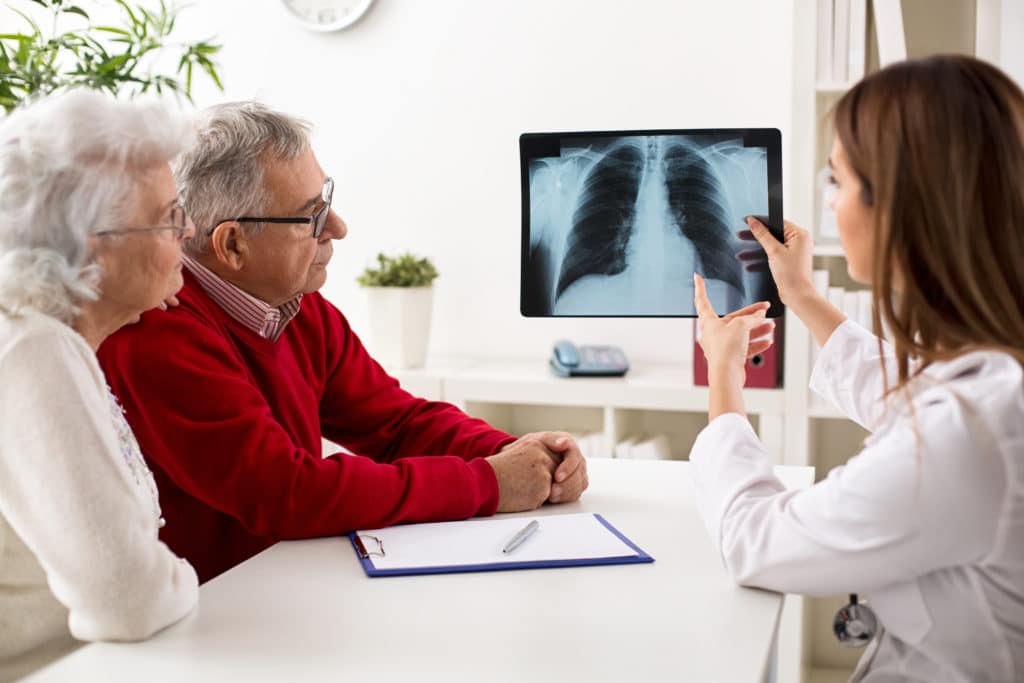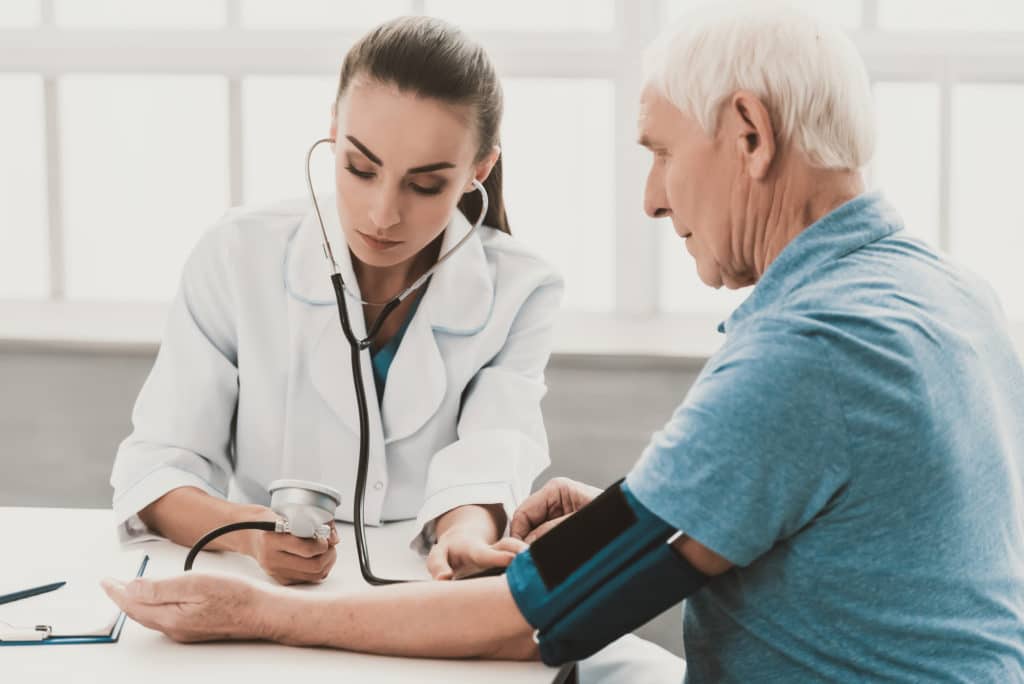Pneumonia in the Elderly: Causes, Treatment, and Prevention
According to the Centers for Disease Control and Prevention, more than three million Americans develop pneumonia each year. As you age, your risk of developing this infection increases.
Pneumonia can cause serious complications in older adults and can even be fatal. Take this time to educate yourself on the causes, symptoms, treatment, and prevention of pneumonia in the elderly.
What Is Pneumonia?

Pneumonia is an infection that results in the inflammation of air sacs in one or both of your lungs. The tiny sacs fill with fluid and disrupt the process your lungs use to create oxygen. As a result, you may have difficulty breathing. If left untreated, vital organs may not receive enough oxygen, bacteria can enter your bloodstream, and fluid can surround your lungs.
There are two main types of pneumonia – bacterial and viral. Bacterial pneumonia occurs when your immune system is weak from illness, poor nutrition, or age, and bacteria infiltrates your lungs.
If you smoke, abuse alcohol, have a respiratory disease, or have recently had surgery, you have a higher risk because your immune system is weakened. Viral pneumonia is caused by a virus, most commonly the influenza (flu) virus, and is responsible for roughly one-third of all pneumonia cases. Both types can range from mild to life-threatening.
What Causes Pneumonia in Elderly Patients?
According to the American Lung Association, there are more than 30 different bacterias, viruses, and fungi that lead to pneumonia. When pneumonia starts to spread through your lungs, your white blood cells will attack the germs. The area will become inflamed.
What Are the Symptoms of Pneumonia in Elderly Patients?
Bacterial and viral pneumonia have different symptoms, and can often be confused with bronchitis or the flu. Bacterial pneumonia can make your temperature rise as high as 105 degrees and cause excessive sweating, a high heart rate, and heavy breathing. Your lips and nails may develop a blue tint from the lack of oxygen. Other bacterial symptoms include:
- Green, yellow, or bloody mucus
- Fever
- Loss of appetite
- Low energy
- Chills
- Chest pain when breathing or coughing
- Shortness of breath
On the other hand, the initial symptoms of viral pneumonia have the same symptoms of the flu. Within 36 hours, you may see a small amount of mucus and you may also see a blue tint on your lips. Other viral symptoms include:
- Headaches
- Muscle pain
- Weakness
- Worsening cough
- Shortness of breath
Pneumonia in Elderly Recovery Time
The average healthy person can recover from pneumonia in one to three weeks, but depending on your immune system, recovery can last weeks or even months.
Coughing is the primary way to get the infection out of your body, and it takes a lot of your energy. Once you clear the infection, it can still take several more weeks to regain your strength.
Pneumonia in Elderly Survival Rate
Pneumonia can form very quickly and can rapidly spread to other parts of your body. The disease puts your immune system into overdrive and your body cannot create enough oxygen for your vital organs. Pneumonia can also worsen the symptoms of your other ailments, like heart disease.
Pneumonia in Elderly With Dementia
Dementia usually refers to a decline in mental ability that seriously impacts a person’s everyday life. Short-term memory loss and confusion and are most common when dementia results from an injury or an infection such as pneumonia.
According to the Alzheimer’s Association, the symptoms of dementia can be different in every person. However, a person may have dementia if two or more of the following functions are impaired significantly:
- Memory
- Ability to communicate
- Ability to focus and pay attention
- Reasoning and judgment
- Visual perception
Pneumonia in Elderly With COPD
People with chronic lung disease may be more susceptible to pneumonia. The combination of COPD (chronic obstructive pulmonary disease) and pneumonia is particularly dangerous because it presents an increased risk of respiratory failure, which means that your body can’t get enough oxygen or can’t successfully remove carbon dioxide.
If you have COPD and think you might have symptoms of pneumonia, be sure to call your doctor right away.
Pneumonia Treatment

A doctor can determine if you have pneumonia through physical exams, chest x-rays, blood tests, CT scans, and other tests. Depending on the severity and type of infection there are several treatment options. Most cases can be treated at home with a combination of antibiotics, hydration, fever control, and rest.
However, some cases may require hospitalization. If hospitalized, you will likely receive fluids and antibiotics through an IV as well as breathing treatments and oxygen therapy.
Your risk of being admitted increases if you have another serious medical problem, more severe symptoms, or if you have been taking antibiotics at home and are not recovering.
Can Pneumonia Heal on Its Own?
Pneumonia cannot heal on its own. It’s important to start treating your symptoms as soon as possible. You can treat your symptoms at home, but visiting a doctor and getting antibiotics is highly recommended, especially for older adults and children.
Pneumonia Prevention
Pneumonia in the elderly along with pneumonia in other adults and children can oftentimes be prevented by practicing healthy habits including:
- Washing your hands regularly — especially after blowing your nose, using the restroom, or eating.
- Avoiding smoking
- Eating a healthy diet
- Exercising regularly
Since the flu is a common cause of pneumonia, get your flu shot! Did you know Medicare pays for your annual flu shot? Read more about preventing the flu here.
Pneumonia Vaccine
Another form of pneumonia prevention is the pneumococcal vaccine. This can help protect you from bacterial pneumonia and is recommended for anyone over the age of 65.
There are two vaccine types, PCV13, and PPSV23. You and your doctor can work together to help determine which type is best for you. However, please note, the vaccination is not guaranteed to prevent the infection entirely, but it can drastically lower your risk. Your Medicare plan can cover the cost.
Pneumonia and Your Medicare Plan
Practicing a healthy lifestyle is one of the best ways to keep your immune system strong. Medicare Advantage plans can make sure you’re living the healthiest life possible. These plans may offer additional benefits beyond Original Medicare like routine physical exams and a monthly allowance for over the counter products and medications!
We have licensed agents across 38 states who are contracted with all the major carriers! This means they can answer your questions and enroll you in a plan with an honest and unbiased approach. If you have any questions or are interested in arranging a no-cost, no-obligation appointment, call us at 844-431-1832 or fill out this form.


